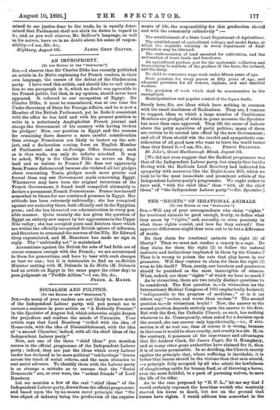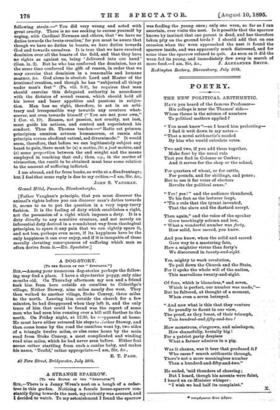THE "RIGHTS" OF IRRATIONAL ANIMALS.
[To THE EDITOR OF THE " SPECTATOR.") SIR,—Will any of your correspondents who claim " rights " for irrational animals be good enough, firstly, to define what they mean by "rights," and, secondly, to state precisely in what these rights consist, and how far they extend ? Our apparent differences might then turn out to be but a difference of words.
Do they claim for irrational animals the right (1) of liberty ? Then we must not confine a canary in a cage. Do they claim for them the right (2) to follow the natural instincts and inclinations implanted in them by the Creator ? Then it is wrong to poison the rats that play havoc in our granaries. Will they venture to claim for them the right (3) even to life itself P Then, surely, our butchers and poulterers should be punished as the most incorrigible of sinners. What, indeed, are these "rights" of which we hear so much ?
As to vivisection, there are two totally distinct questions to be considered. The first question is,—Is vivisection (as the International Medical Congress of 1881 emphatically declared) "indispensable to the progress of medicine ; " or is it (as others say) "useless, and worse than useless "? The second question is,—Is vivisection lawful ? Now, the answer to the second question depends entirely upon the answer to the first. But with the first, the Catholic Church, as such, has nothing whatever to do. Consequently, when asked for a decision upon the second, she can answer only hypothetically,—i.e., if vivi- section is of no real use, then of course it is wrong, because in that case it would be sheer cruelty, and cruelty is a sin. If, on the contrary, it possesses all the importance and advantages that Sir Andrew Clark, Sir James Paget, Sir G. Humphrey, and so many other great authorities have claimed for it, then. it is of course permissible. In so deciding, the Church merely applies the principle that, where suffering is inevitable, it is better that beasts should be the victims than that men should, —a principle fully accepted by all who admit the lawfulness of slaughtering cattle for human food, or of throwing a horse, even the most faithful, to a pack of pursuing wolves, to save the life of its rider.
As to the case proposed by "B. P. L.," let me say that / would certainly reproach the heartless wretch who wantonly starved his horse to death, but not on the ground that horses have rights. I would address him somewhat in the following strain :—" You did very wrong and acted with great cruelty. There is no use seeking to excuse yourself by urging, with Cardinal Newman and others, that we have no duties towards the brute creation,' for you must be aware that though we have no duties to beasts, we have duties towards God and towards ourselves. It is true that we have received dominion over all the beasts of the field, and that they have no rights as against us, being delivered into our hand' (Gen. ix. 3). But he who has conferred the dominion, has at the same time conferred the gift of reason, in order that we may exercise that dominion in a reasonable and humane manner, &c. God alone is absolute Lord and Master of the irrational creation, and though he has "subjected all things under man's feet" (Ps. viii. 8-9), he requires that man should exercise this delegated authority in accordance with the dictates of sound reason, which should hold all his lower and baser appetites and passions in subjec- tion. Man has no right, therefore, to act in an arbi- trary and irresponsible way towaMs any creature what- soever, not even towards himself (" You are not your own," 1 Cor. vi. 19). Reason, not passion, not cruelty, not lust, must guide his actions, and control and superintend his conduct. Thus St. Thomas teaches :—" Ratio est primum principium (minium actuum humanorum, et mania alia principia eorum obedinnt rationi, sed diversimode." It would seem, therefore, that before we can legitimately subject any beast to pain, there must be (a) a motive, (b) a just motive, and (c) some proportion between the end sought and the means employed in reaching that end ; thus, e.g., in the matter of vivisection, the result to be obtained must bear some relation to the amount of suffering inflicted.
I am abroad, and far from books, so write at a disadvantage; but I feel that some reply is due to my critics.—I am, Sir, &c.,
JOHN S. VAUGHAN.
Grand Hotel, Pautvels, Blankenberghe.
[Father Vaughan's principle, that you must discover the animal's rights before you can discover man's duties towards it, seems to us to put the question in a very topsy-turvy fashion. It is the feeling of duty which establishes a right, not the possession of a right which imposes a duty. It is a duty directly to any sensitive creature, and not merely an inferential duty derived in a roundabout way from theological principles, to spare it any pain that we can rightly spare it, and not less, perhaps even more, if its happiness here be the only happiness it can ever enjoy, and if it is incapable of those morally elevating consequences of suffering which men so often derive from it.—En. Spectator.]



































 Previous page
Previous page